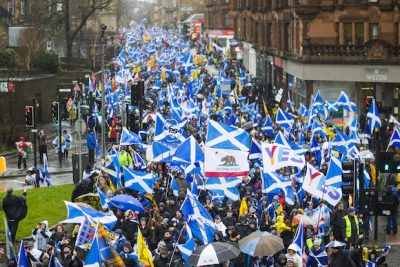Has COVID-19 Paved the Way for an Independent Scotland?

It has been one of the worst periods in our global history. But for Scottish Nationalists, the pandemic was the crisis needed to escalate the independence cause. In the latest poll on Scottish independence, now 53% support it, with 47% against. It is the highest ever number of people to support leaving the Union. Now Unionists must wake up and smell the coffee.
Of course it isn’t an overwhelming figure of support. But to appreciate the significance of this milestone in the journey that the independence cause has taken, it’s important to remember how we got here. Take for example, the percentage of people in favour of independence in the run-up to the 2014 referendum. Polls showed at the time it was a mere 32-38%. Then you have to think about the extraordinary rise of the Scottish National Party over the last couple of decades. Earlier in the 20th century the SNP was a radical fringe party, no-one ever thought it could get elected to government. By 2007 it had gained power in Scottish parliament, forming a minority government. Since then it has only gone from strength to strength, in recent years dominating the Scottish political scene.
Foreigners often ask me, why are more Scots not in favour of independence, surely every people has the desire for self-determination? My answer: of course there is a desire. But for centuries the notion of what it is to be Scottish was literally beaten out of people. People were banned from wearing the kilt – the national dress, and forced to speak English instead of Gaelic or Scots. When my grandmother went to school in the 1920s children were beaten for speaking in their native tongue. Then you have the power of the media. Decades of a London-based broadcasting service – the BBC – had huge influence over the Scots’ way of thinking about themselves. The propaganda has been so effective as to persuade many people that Scotland is not capable of governing itself, that it cannot manage without England, that its language and culture is somehow inferior to that of English.
And yet there has always remained a grassroots level of support for independence, the descendents of those who fought the wars of independence of the 13th and 14th centuries and the later Jacobite rebellions; those who have never forgotten how sovereignty was stolen. Or ‘sold’ as some might say. For although there was opposition to the 1707 Union Act right up until its signing, those who did vote the country out of existence, reaped the financial benefits of doing so, receiving titles and land. As Sir Walter Scott said, the men who sold Scotland to the English, were ‘bought and sold’. He described them as ‘false and corrupted’, writing that ‘the interests of Scotland were considerably neglected in the Treaty of Union; and in consequence the nation, instead of regarding it as an identification of the interests of both kingdoms, considered it as a total surrender of its independence’.
The Union has never been able to address Scotland’s interests effectively; the nations have never been equal partners. Even with a devolved parliament Scotland is not in charge of its own broadcasting, benefits and social policy, defence, foreign policy, immigration policy, or trade and industry. Furthermore, it needs ‘permission’ to hold a referendum on independence; authorization which Boris Johnson is not granting. But such an unequal relationship is proving problematic now for the Union’s future. Just as Margaret Thatcher’s poll tax two decades ago paved the way for the creation of a Scottish parliament, so the UK’s pursuit of Brexit has laid the foundations of another rebellion. Once again the Scottish people are being taken down a path they rejected; we didn’t vote to leave the EU and yet have been left with no choice but to comply with Westminster’s wishes.
The final nail in the Union’s coffin, however, has come of late. Every cloud has a silver lining, and this pandemic has without a doubt boosted Scotland’s desire for independence. Opinion polls prior to Covid-19 showed a majority were still in favour of remaining in the UK, a Panelbase poll on 3rd December 2019 showed 50% to 44% voted against independence. And yet the numerous surveys carried out since the beginning of the pandemic consistently show the opposite.
Undoubtedly, credit for this change goes to Scotland’s First Minister, Nicola Sturgeon, and her handling of the crisis. A poll on 26th May this year demonstrated just how much better people thought Sturgeon had dealt with the pandemic compared to her Westminster counterpart. A remarkable 82% praised Sturgeon, with only 30% saying they thought Johnson had handled it well. The First Minister’s daily press briefings, consistent messaging and assurances, together with effective track and trace programmes which have significantly reduced the number of cases of coronavirus, have all demonstrated effective leadership. This has led to Sturgeon gaining advantage in one main area: trust. Johnson simply can’t compete with that, as England struggles to contain the pandemic with the biggest economic recession in history on the horizon.
It’s difficult to see how Johnson can turn things around. Panic is reportedly setting in in Westminster, as officials realize they are on the precipice of losing Scotland once and for all. It remains to be seen how Scotland can engineer a second referendum if Westminster won’t grant one. But as the old saying goes, ‘Where there’s a will, there’s a way’.
*
Note to readers: please click the share buttons above or below. Forward this article to your email lists. Crosspost on your blog site, internet forums. etc.
This article was originally published on InfoBrics.
Johanna Ross is a journalist based in Edinburgh, Scotland.
Featured image is from InfoBrics

